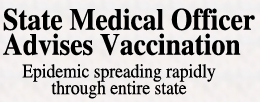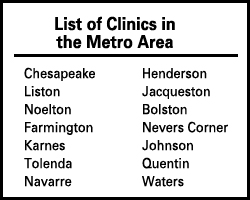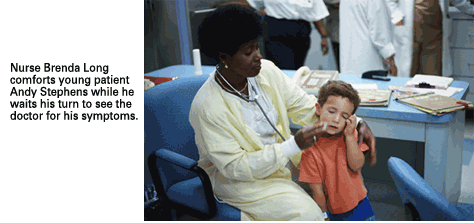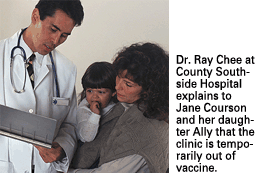


An epidemic respiratory virus is spreading rapidly throughout the state. The infection is carried, apparently, through discharges from the nose and throat in the form of spray when sneezing or coughing, or by the use of a common drinking cup. Relapses are not uncommon, and complications, particularly bronchitis, pneumonia and cardiac weakness may follow the disease. People of all ages are susceptible to the virus, but children and the elderly are especially vulnerable.
The state medical officer, Dr. Stephen Brown, is asking that the public take active steps to help protect themselves and others. "The best thing you can do is get vaccinated. If for some reason you cannot be vaccinated, avoid crowds, use your handkerchief if you sneeze or cough around others, and see your doctor immediately if you have any of the symptoms of this virus, such as sneezing or coughing, combined with headache and or body aches," advises Brown.
Brown specifically encouraged physicians to check their records to see which of their high risk patients need a vaccine, but have not yet been vaccinated. Children younger than two years old, elderly patients and those with medical conditions, such as diabetes, or heart or lung diseases including asthma, are considered high-risk and should schedule their shot as soon as possible. Health care workers and people who live with high-risk persons also are encouraged to receive the vaccine so that they don't pass the virus to those most susceptible.


The state program manager for vaccines at the State Department of Health, Margo Adams, is being bombarded with questions from health-care providers who want to know why their vaccines are late and what she's going to do about it. Her department coordinates the vaccine supply for about 3,000 providers in the state's vaccination program.
Adams said she understands the providers' concern with getting people back for vaccinations after they've been turned away once due to a lack of vaccine supply. Adams said that the state had received only about a fifth of what is needed to vaccinate the most at-risk population: small children and the elderly.
When vaccine supplies run out, doctors have to track patients and tell them to come back when the supply is back up. In critical situations, they send patients to other providers such as county clinics. However, the clinics are facing the same situation as the local health care providers: too little vaccine for the need.
Once the supply is back to normal every-where, Adams said, the state will hold special clinics so that as many people as possible can be vaccinated.

More than 140 illness-related school closings have been reported in the state. That number is well above the number reported for the past two years due to illnesses. State health officials say the virus is hitting hard among children under 10 who haven't had vaccinations. The virus has caused school closings in three northern counties this week and school closings were widespread across the southern part of the state last week.
With more than a quarter of students absent Thursday, School Superintendent Leroy Winkle said he hopes closing schools will give the virus a chance to run its course. "It finally caught up with us this week," he said, noting the virus was particularly prevalent among elementary school students. "In my 20 years of school, I have never seen this many closings, but then again I have never seen this kind of sickness either. Doctors said this was extremely contagious, so we made the decision to close." Winkle also said that increasing numbers of faculty were being affected by the virus, too.
Public schools receive some funding based on eligible pupil credits which dip along with attendance. Several days with a large percentage of students absent may represent a significant loss of these credits and money.



The virus which has closed so many schools in our state is making more adults sick, too. Athletic events, bingo games, even church services are being cancelled because of low attendance. Businesses are closing because there is a shortage of both employees and customers. All over the state sick children and their parents are staying home to fight the virus. In the meantime counties have had to cancel a number of vaccination clinics scheduled for this week due to a delay in distribution of the vaccine.
While the final costs of the virus outbreak won't be known for a while, the state department of commerce estimates that direct costs will range from $20-30 million dollars in lost revenue and opportunities. Many small businesses have said that it may take years for them to recover.

The state's hospitals have been overwhelmed with sick patients this month,
due to the respiratory virus currently sweeping the state. The state health
department is following the issue of occupancy rates and hospital capacity
closely. "We are concerned about the capacity being stretched on an
ongoing basis," said a state health department spokesperson.
The difficulties caused by the virus are crowded emergency rooms, filled-to-capacity hospital wings and high numbers of diversions. A hospital is on diversion when it cannot accept patients being transported by emergency vehicles.
"As are all the communities' resources, hospitals are stretched thin," said a spokesperson for the state hospital association. "The emergency rooms and in-patient facilities are very busy. We have tried to work with physicians on some ways that they may be able to expedite patient discharge for patients who can be cared for in other settings."
